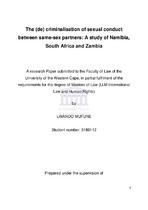| dc.contributor.advisor | Le Roux, Wessel | |
| dc.contributor.author | Mufune, Lwando | |
| dc.date.accessioned | 2015-10-19T09:03:32Z | |
| dc.date.available | 2015-10-19T09:03:32Z | |
| dc.date.issued | 2012 | |
| dc.identifier.uri | http://hdl.handle.net/11394/4576 | |
| dc.description | Magister Legum - LLM | en_US |
| dc.description.abstract | The main objective of this paper is to explore the legal status of sodomy laws in three African states (South Africa, Zambia and Namibia) from an international human rights perspective. The paper presents an argument that sodomy laws violate a number of international human rights, most notably the right to equality or non-discrimination and the right to privacy, and that these violations cannot be justified with an appeal to the international human rights of culture and self-determination. In fact, judicial intervention to declare sodomy laws unconstitutional might even be justified purely as a principle of constitutional democracy as such. An argument to this effect is developed in section 2 of the paper. | en_US |
| dc.language.iso | en | en_US |
| dc.publisher | University of the Western Cape | en_US |
| dc.subject | Sodomy laws | en_US |
| dc.subject | International human rights | en_US |
| dc.subject | Namibia | en_US |
| dc.subject | South Africa | en_US |
| dc.subject | Zambia | en_US |
| dc.title | The (de) criminalisation of sexual conduct between same-sex partners: a study of Namibia, South Africa and Zambia | en_US |
| dc.rights.holder | University of the Western Cape | en_US |

